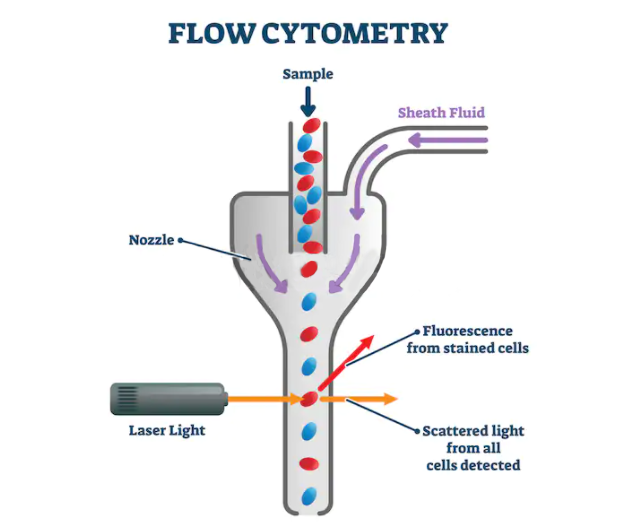 Flow cytometry (FCM) is a technology developed in the 1970s to quickly and accurately identify and classify immune cells and other cells. It mainly includes fluid flow technology, cell sorting and counting technology, as well as data collection and analysis technology, etc. At present, FCM has become an important biological tool for detecting various components of cells. It can not only quantitatively detect various cellular components in cell membranes, cytoplasm, nucleus, and various soluble biomolecular components in serum, but also study various functional states of cells. In recent decades, with the continuous discovery of new fluorescent substances and the increasing improvement of computer functions in data storage, display analysis, etc., FCM has transitioned from the previous qualitative description to quantitative research, and can conduct data statistics, which has greatly improved the scientific nature of experimental results. Based on the above characteristics, FCM has become an important research technique for clinical diagnosis and has a wide application prospect.
Flow cytometry (FCM) is a technology developed in the 1970s to quickly and accurately identify and classify immune cells and other cells. It mainly includes fluid flow technology, cell sorting and counting technology, as well as data collection and analysis technology, etc. At present, FCM has become an important biological tool for detecting various components of cells. It can not only quantitatively detect various cellular components in cell membranes, cytoplasm, nucleus, and various soluble biomolecular components in serum, but also study various functional states of cells. In recent decades, with the continuous discovery of new fluorescent substances and the increasing improvement of computer functions in data storage, display analysis, etc., FCM has transitioned from the previous qualitative description to quantitative research, and can conduct data statistics, which has greatly improved the scientific nature of experimental results. Based on the above characteristics, FCM has become an important research technique for clinical diagnosis and has a wide application prospect.
The workflow of flow cytometry is as follows. Planning the workflow in advance as shown in the figure helps to improve the success rate of the experiment.

Flow cytometry is widely used in basic research and clinical practice, and plays an important role in the fields of cell biology, hematology, immunology, oncology, pharmacology, genetics, and clinical testing. It can assist in the diagnosis of various diseases such as blood diseases, cancer, autoimmune diseases, antiviral infections and so on. One of the most common applications is the diagnosis of blood-related cancers, such as leukemia and lymphoma. Take leukemia as an example, use fluorescent dye-treated specific monoclonal antibodies, such as CD2, CD7, CD10, CD14, CD19, CD33, CD34, CD41, CD64 and HLA-DR, etc., to detect the presence or absence of various cell components commonly seen in leukemia, thus achieving the purpose of diagnosis. In the early stage of malignant disease, there may be only a few cancer cells in the sample, and routine examination under the microscope may not be able to find these cancer cells, so flow cytometry is particularly useful in the early stage of malignant disease.
Flow cytometry is a new technology that can quickly, accurately, and high-throughput the characteristics or functions of a single particle to perform multi-parameter qualitative and quantitative analysis. The advantage of FCM is that it can quickly measure multiple indicators at the same time, and it transitions the diagnosis result from the previous qualitative description to the quantitative research, which greatly improves the scientific nature of the results.
Creative Biogene has accumulated years of experience in flow cytometry. We promise to provide you with the best diagnostic products. You can choose us with confidence.
Please contact us for more details.
Reference
Copyright © 2026 Creative Biogene. All rights reserved.